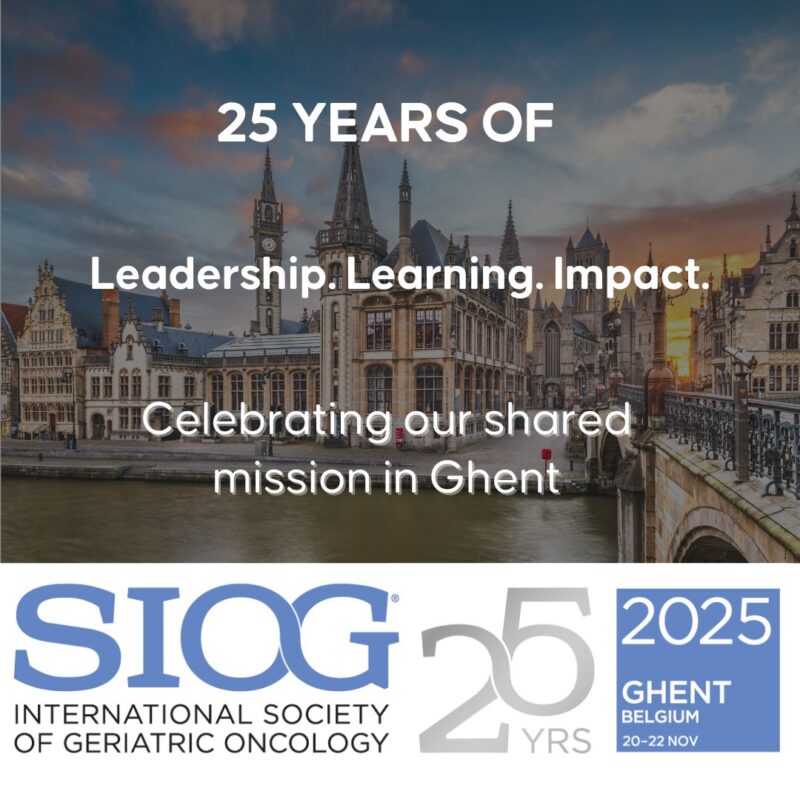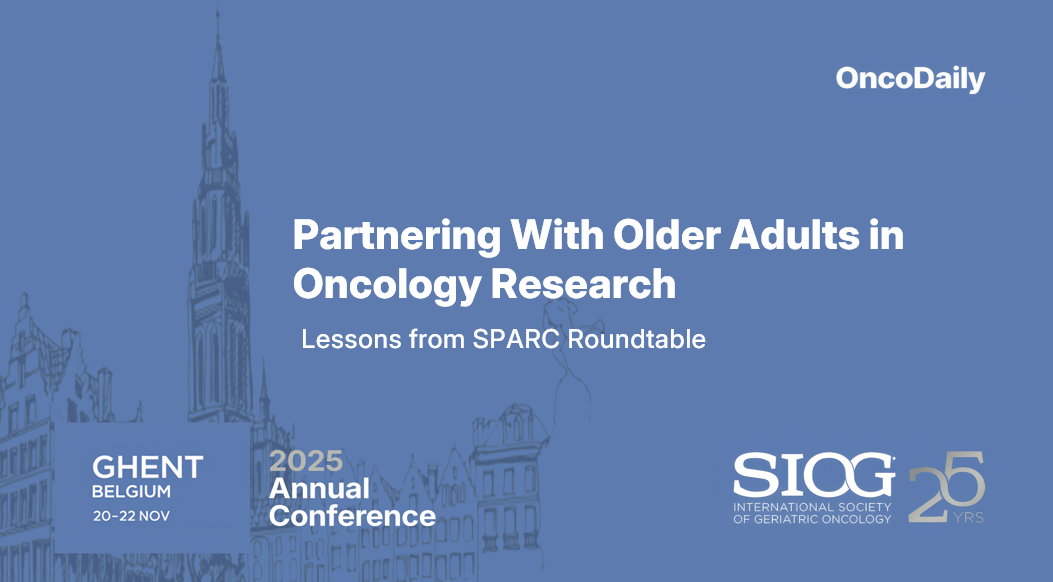Fresh from the SIOG 2025 Annual Conference, the SPARC Roundtable on “Partnering with Older Adults in Oncology Research: Engagement, Endpoints & Design” took a hard look at how well cancer research reflects the realities and priorities of older adults. Building on last year’s focus on patient-centred care, this year’s meeting turned to patient-centred outcomes and what they should mean in practice.

While oncology has traditionally prioritised survival and tumour response, the Roundtable underlined that many older adults place equal or greater value on quality of life, symptom relief, communication, independence, and the ability to remain in their own homes. The central question was clear: how can research, endpoints, and trial design be reshaped so that “success” in cancer care aligns with what matters most to older patients?
From Tokenism to True Partnership
The first part of the session explored how to move beyond tokenistic involvement of patients in oncology research towards genuine partnership.
Speakers described models in which older adults and caregivers are engaged from the very beginning of a study: helping to frame the research question, select primary outcomes, design consent forms and educational materials, guide recruitment strategies, and co-author the resulting publications. In these examples, patient groups are not an add-on but a driving force. They choose their own members, decide which projects to support, train site staff, and help interpret the data.
Several practical ingredients for true partnership emerged:
- Patient groups need to lead their own structures, rather than being directed by researchers.
- Patient partners should be treated as co-investigators, including appropriate compensation and administrative support.
- Research teams must be prepared to shift priorities when patient feedback shows that conventional endpoints (such as progression-free survival) do not capture what patients experience as meaningful benefit.
These experiences have fundamentally changed how some research teams operate, moving from investigator-driven designs to co-developed studies that integrate both quantitative outcomes and qualitative data on patient experience.
Redefining Success: Endpoints and PROMs for Older Adults
The second part of the Roundtable examined how endpoints and patient-reported outcome measures (PROMs) can better reflect the realities of older adults with cancer.
Key challenges discussed included:
- Endpoints that miss what matters – Trials often prioritise survival or radiographic response while under-measuring pain, fatigue, function, and treatment burden.
- Lack of geriatric-specific tools – Many instruments were never validated in populations with multimorbidity, frailty, or cognitive impairment.
- Higher dropout rates – Older adults are more likely to discontinue trials because of illness, fatigue, logistics, or death, which can bias results if not appropriately handled.
- PROMs not adapted for age – Tools may rely on digital platforms, assume high literacy, or focus on symptoms that are not top priorities for older participants; caregiver reports can fill gaps but may not fully reflect the patient voice.
Participants highlighted ongoing work to refine geriatric oncology endpoints and to update position papers that guide trial design. There was strong emphasis on ensuring that PROMs are not only collected but also used in regulatory decisions, HTA reviews, and clinical practice, so that patient-reported data has real influence.
Regulators, Industry and Funders: Shared Responsibility
Regulatory representatives noted that although guidelines call for trial populations to reflect the patients seen in real-world practice, older adults—especially those with multiple comorbidities—remain under-represented in pivotal studies. Sponsors often fear that including frailer patients will “complicate” the data and jeopardise approval, even though these are the patients most likely to receive the medicines once authorised.
To address this, multi-stakeholder initiatives are now looking at:
- How to include dedicated cohorts of older or frail adults within pivotal programmes.
- How to use real-world data and pragmatic elements to complement traditional efficacy trials.
- How regulators, HTA bodies, and payers can align on expectations for evidence in older populations.
From the industry side, participants described internal efforts to bring more older adults into trials and to capture age-specific evidence, while acknowledging that progress is still too slow and often not visible in headline trial results.
Funders, particularly philanthropic organisations, were highlighted as important catalysts. Many now require meaningful patient engagement as a condition of support, reviewing not only scientific quality but also how patient partnerships are structured and sustained. Some funders systematically ask patient groups whether they feel heard and whether their input has changed the project, moving beyond “checkbox” involvement towards genuine co-creation.
The Role of Patient Advocates – and Professionals
Patient advocates at the Roundtable stressed that partnership must be a shared responsibility. While many older adults are willing and able to advocate, they should not carry the burden alone. Clinicians, researchers, regulators, payers, and funders all have an obligation to create systems where older adults can participate meaningfully without being asked to “fix” structural problems by themselves.
At the same time, advocates emphasised the long history of patient-centred outcomes research and the wealth of existing tools, training materials, and network models that others can adapt, rather than starting from scratch.
Moving Forward: Building Age-Inclusive Evidence
Across the SPARC Roundtable, there was broad agreement that oncology research for older adults must evolve from treating this population as an afterthought to recognising them as the core of real-world cancer care.
This requires:
- Embedding older adults and caregivers throughout the research lifecycle.
- Developing and validating endpoints and PROMs tailored to geriatric realities.
- Redesigning trials to include patients with comorbidities, functional limitations, and diverse living situations.
- Aligning regulators, HTA agencies, payers, and funders around expectations for age-inclusive evidence.
- Treating patient partners as equal contributors, with the structures and support to make that possible.
The message from SIOG 2025 was clear: redefining success in oncology for older adults means measuring what truly matters to them—and doing research with, not just about, the people it aims to serve.
For more information click here.


